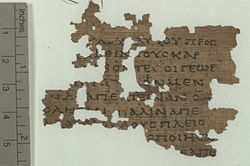Verse 12
- And Jesus went into the temple of God,
- and cast out all them that sold and bought in the temple,
- and overthrew the tables of the moneychangers,
- and the seats of them that sold doves, [20]
"Money changers": are certain people who sat in the temple at certain times, to receive the "half shekel", and sometimes change the money for it to themselves. It was a custom for every Israelite, once a year, to pay half a shekel towards the temple charge and service, based on the orders given by God to Moses in the wilderness during the numbering of the Israelites, to take half a shekel out of everyone twenty years of age and older, rich or poor (Exodus 30:13), though this does not seem to be designed as a perpetual rule. However, it became a fixed rule, and was annually paid. [21] Every year a public notice was given in all the cities in Israel, that the time of paying the half shekel was nearing, so the people will be ready with their money, for everyone was obliged to pay it, as stated, [22] Notice being thus given, [23] "on the fifteenth day (of the same month), "tables" were placed in the province, or city (which Bartenora [23] interprets [as] Jerusalem; but Maimonides says, [22] the word used is the name of all the cities in the land of Israel, excepting Jerusalem), and on the twenty fifth they sit "in the sanctuary". The same is related by Maimonides. [24] This gives a plain account of these money changers, their tables, and their sitting in the temple, and on what account. These exchangers had a profit, called "Kolbon", in every shekel they changed. [25] This "Kolbon" gives the name "Collybistae" for these exchangers in this text. [26] [27] The large gain must amount to a great deal of money. They seemed to work within the frame of law when Christ overturned their table, unless it should be objected, that this was not the time of their sitting, because that happened a few days before the Passover, which was in the month Nisan (the tenth of Nisan, when Christ entered the temple), whereas the half shekel should be paid in the month Adar until the twenty fifth of Adar. Moreover, these men had other business, such as money exchange, especially at such a time as the passover, when persons came from different parts of world to attend it; and might want to exchange their foreign money for current money. [28] [29]

